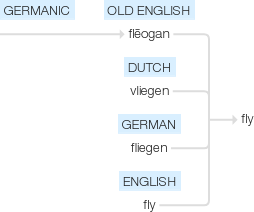Fly
Old English flēogan, of Germanic origin; related to Dutch vliegen and German fliegen, also to fly2.
wiktionary
From Middle English flye, flie, from Old English flȳġe, flēoge(“a fly”), from Proto-Germanic *fleugǭ(“a fly”), from Proto-Indo-European *plewk-(“to fly”). Cognate with Scots flee, Saterland Frisian Fljooge, Dutch vlieg, German Low German Fleeg, German Fliege, Danish flue, Norwegian Bokmål flue, Norwegian Nynorsk fluge, Swedish fluga, Icelandic fluga.
From Middle English flien, from Old English flēogan, from Proto-Germanic *fleuganą (compare Saterland Frisian fljooge, Dutch vliegen, Low German flegen, German fliegen, Danish flyve, Norwegian Nynorsk flyga), from Proto-Indo-European *plewk-(*plew-k-, “to fly”) (compare Lithuanian plaũkti ‘to swim’), enlargement of *plew-(“flow”). More at flee and flow.
Origin uncertain; probably from the verb or noun.
Related to German Flügel(“a wing”), Dutch vleugel(“a wing”), Swedish flygel(“a wing”).
etymonline
fly (n.)
Old English fleoge "a fly, winged insect," from Proto-Germanic *fleugon "flying insect" (source also of Old Saxon fleiga, Old Norse fluga, Middle Dutch vlieghe, Dutch vlieg, Old High German flioga, German Fliege "fly"); literally "the flying (insect)" (compare Old English fleogende "flying"), from PIE root *pleu- "to flow," which is also the source of fly (v.1).
Originally any winged insect (moths, gnats, beetles, locusts, hence butterfly, etc.) and long used by farmers and gardeners for any insect parasite. Flies figuratively for "large numbers" of anything is from 1590s. Plural flien (as in oxen, etc.) gradually normalized 13c.-15c. to -s. Fly in the ointment is from Eccles. x:1. Fly on the wall "unseen observer" first recorded 1881. No flies on _____ "no lack of activity or alertness on the part of," is attested by 1866. Meaning "fish-hook dressed to resemble an insect" is from 1580s; Fly-fishing is from 1650s. Fly-catcher "bird which eats insects on the wing" is from 1670s. The fly agaric mushroom (1788) so called because it was used as a poison for flies.
The sense of "a flight, flying" is from mid-15c. From the verb and the notion of "flapping as a wing does" comes the noun sense of "tent flap" (1810), which was extended to "strip of material sewn into a garment as a covering for buttons" or some other purpose (1844). Baseball fly ball attested by 1866. To do something on the fly is 1856, apparently from baseball.
When the catcher sees several fielders running to catch a ball, he should name the one he thinks surest to take it, when the others should not strive to catch the ball on the fly, but only, in case of its being missed, take it on the bound. ["The American Boys Book of Sports and Games," New York, 1864]
fly (v.1)
"to soar through air; move through the air with wings," Old English fleogan "to fly, take flight, rise into the air" (class II strong verb; past tense fleag, past participle flogen), from Proto-Germanic *fleugan "to fly" (source also of Old Saxon fliogan, Old Frisian fliaga, Middle Dutch vlieghen, Dutch vliegen, Old High German fliogan, German fliegen, Old Norse flügja), from PIE *pleuk-, extended form of root *pleu- "to flow."
Meaning "go at full speed" is from c. 1300. In reference to flags, 1650s. Transitive sense "cause to move or float in air" (as a flag, kite, etc.) is from 1739; sense of "convey through the air" ("Fly Me to the Moon") is from 1864. Related: Flew; flied (baseball); flown; flying. Slang phrase fly off the handle "lose one's cool" dates from 1825.
fly (v.2)
"run away," Old English fleon, flion "fly from, avoid, escape;" essentially a variant spelling of flee (q.v.). In Old English, this verb and fleogan "soar through the air with wings" (modern fly (v.1)) differed only in their present tense forms and often were confused, then as now. In some Middle English dialects they seem to have merged completely. Distinguished from one another since 14c. in the past tense: flew for fly (v.1), fled for fly (v.2).
fly (adj.)
slang, "clever, alert, wide awake," by 1811, perhaps from fly (n.) on the notion of the insect being hard to catch. Other theories, however, trace it to fledge or flash. Slang use in 1990s might be a revival or a reinvention.
